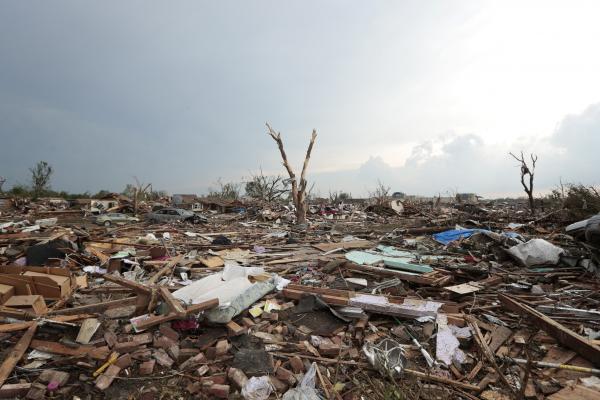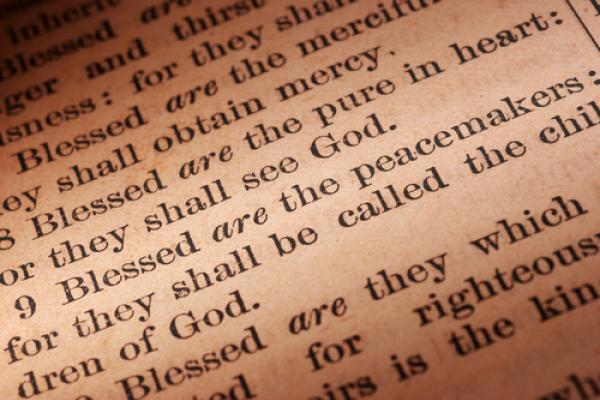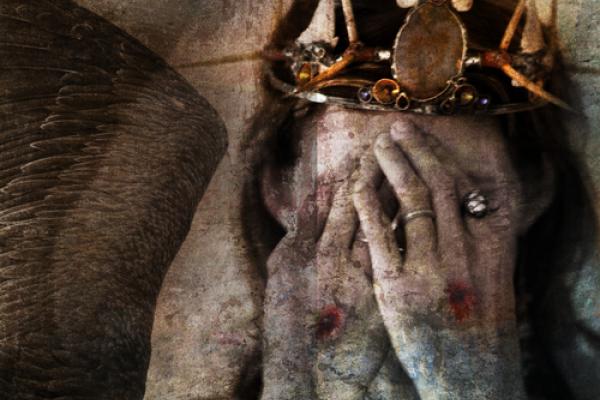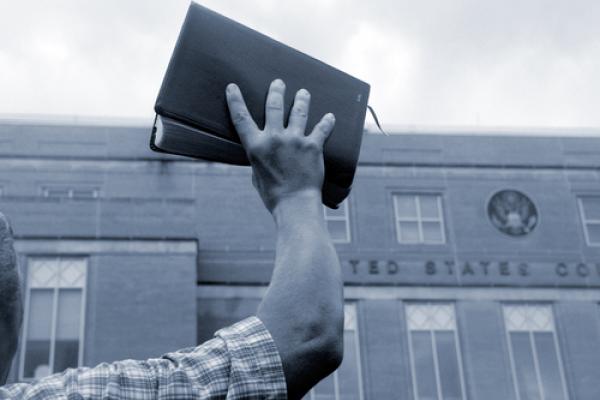“O Lord, our Sovereign, how majestic is your name in all the earth! You have set your glory above the heavens.” And from those heavens descended a deadly cloud.
“Out of the mouths of babes and infants ...” The children of Plaza Towers Elementary?
“What are human beings that you are mindful of them, mortals that you care for them?” Indeed that is the question that troubles the heart of the faithful in times like these.
Can we still praise God? If so, how do we start? Can we possibly understand what happened in Moore, Okla.?
Don’t trust anyone who claims to comprehend the meaning of this storm. Don’t trust anyone who points with absolute certainty to a single cause for this storm. Don’t trust anyone who treats a tornado as anything but indiscriminate and cruel. These tragedies are not punishments or object lessons. Such natural forces do not reach their conclusion with a pat moral or a simple “they lived happily ever after.”
Jesus says some stuff in the inaugural speech of his ministry that really upsets the status quo of both the religious and non-religious. In essence, he says, "If you are to follow me as King of this newly inaugurated Kingdom of God, you will need to start loving your enemies as much as yourself. You will need to start getting creative in how you deal with your oppressors in order to choose the way of love and reconciliation rather than the way of revenge and contempt. In fact, when you live as peacemakers, you best reflect what it looks like to be children of God. Those of you that choose this way of life will be blessed."
A few years later — after Jesus has been announcing the good news of the Kingdom through both word and deed — he looks over Jerusalem and begins to weep. Here is the people and the city that is to symbolize right relationship with God and humanity. It is to be a place of shalom where salvation flows through all aspects of life. It is to be the city of peace. Instead, Jesus stands on the Mount of Olives overlooking the city and laments, "If you, even you, had only recognized on this day the things that make for peace!"
Finally, Jesus, as king, messiah, and deliverer models this way of life to the point of death on a cross. Refusing to accept the lure of power through military might or pursuing peace through violence, Jesus embodies the life of suffering and self-sacrifice that he is calling his followers to emulate. Jesus, as the ultimate peacemaker, shows us that the life and work of peacemaking isn't some fairy tale euphoria, but the gritty, subversive and sacrificial life of faithfulness to a God and kingdom that lives by a different standard than the systems and powers of the world.
God, be with the first responders in Oklahoma, and may all in the communities and families be touched by your restorative will and strength.
I first became aware of the realities of sexual abuse in the church at the tender age of five. I happened to look at the television screen and witnessed police officers escorting my hand-cuffed youth minister in front of a crowd of reporters screaming questions. The words “YOUTH PASTOR ABUSED CHILDREN” flashed across the television screen.
I was confused and scared. My family comforted and assured me that the pastor had only “hurt” teenage boys and that I was safe. The church hired a new minister and, on the surface, life seemed to resume to normal for our congregation. But as a child I had no idea of the effects of the abuse and its aftermath had on the survivors, their families, and our church community. Many families soon experienced disintegrating marriages, friendships were broken, and faith was lost. One survivor’s family had their home repeatedly vandalized and were forced to move hundreds of miles from our town to escape fellow believers who grew angry with them for filing a lawsuit against the perpetrator.
Church leaders shunned media attention and feared “airing dirty laundry” in public, encouraging members to keep the experience a secret for the sake of the boys and church. As a child, and then a teenager, growing up in an otherwise loving, connected church, I never remember hearing church leaders address this aspect of our shared history in the open. To some of the survivors and the broken-hearted, the silence on this topic was welcome; to others it was deafening. While secrecy was the rule, the legacy of the abuse was real and active in the community. Rather than being cared for with dignity and love, the survivors and their families felt that they were a shameful secret to be whispered about and hidden. I learned as an adult that I was intimately connected with some of the survivors but never knew about their silent pain. I had no idea that I was a participant in a culture of silence and shame that often surrounds sexual abuse and is especially pronounced when boys are abused by men in the church.
A group of priests and nuns, some of whom were assaulted as children, has quietly been gathering to publically urge the pope and American bishops to "clean house" on sexual abuse in the church.
Many members in the group, though vocal on sexual abuse cases in the past, did not know eachother until last year, when a laywoman brought them together for as a "confidential support group."
The New York Times reports:
Their aim, they say, is to support both victims and fellow whistle-blowers, and identify shortcomings in church policies. They hope to help not just minors, but also adults who fall prey to clergy who exploit their power for sex. They say that their motivation is to make the church better and safer, and to show the world that there are good priests and nuns in the church.
“We’ve dedicated our lives to the church,” the Rev. John Bambrick, a priest in the Diocese of Trenton, said at a meeting of the group last week in New York. “Having sex offenders in ministry is damaging to our ministry.”&nbsminp;
Read more here.
One of the ongoing discussions of the U.S. drone program is who should control it. Having it under the military provides more oversight and accountability; having it under the CIA provides more secrecy. The Obama administration has apparently decided to begin moving control of at least some drone operations to the military. Reuters reports:
Four U.S. government sources told Reuters that the decision had been made to shift the CIA's drone operations to the Pentagon, and some of them said it would occur in stages.
Drone strikes in Yemen, where the U.S. military already conducts operations with Yemeni forces, would be run by the armed forces, officials said.
But for the time-being U.S. drone strikes in Pakistan would continue to be conducted by the CIA to keep the program covert and maintain deniability for both the United States and Pakistan, several sources said.
Ultimately, however, the administration's goal would be to transfer the Pakistan drone operations to the military, one U.S. official said on condition of anonymity.
Read more here.
Last week Pope Francis spoke out against the cult of money. Here is how Catholic News Service's Carol Glatz summarized his remarks:
Pope Francis called for global financial reform that respects human dignity, helps the poor, promotes the common good and allows states to regulate markets.
"Money has to serve, not to rule," he said in his strongest remarks yet as pope concerning the world's economic and financial crises.
A major reason behind the increase in social and economic woes worldwide "is in our relationship with money and our acceptance of its power over ourselves and our society," he told a group of diplomats May 16.
"We have created new idols" where the "golden calf of old has found a new and heartless image in the cult of money and the dictatorship of an economy which is faceless and lacking any truly humane goal."
The Supreme Court agreed Monday to consider whether prayers can be offered at government meetings — a practice that’s been common in Congress and throughout the states for more than two centuries.
The religious expression case, which comes to the court from the town of Greece, N.Y., focuses on the first 10 words of the First Amendment, ratified in 1791: “Congress shall make no law respecting an establishment of religion.”
That Establishment Clause was violated, the 2nd U.S. Circuit Court of Appeals ruled last year, when the Greece Town Board repeatedly used Christian clergy to conduct prayers at the start of its public meetings. The decision created a rift with other appeals courts that have upheld prayer at public meetings, prompting the justices to step in.





